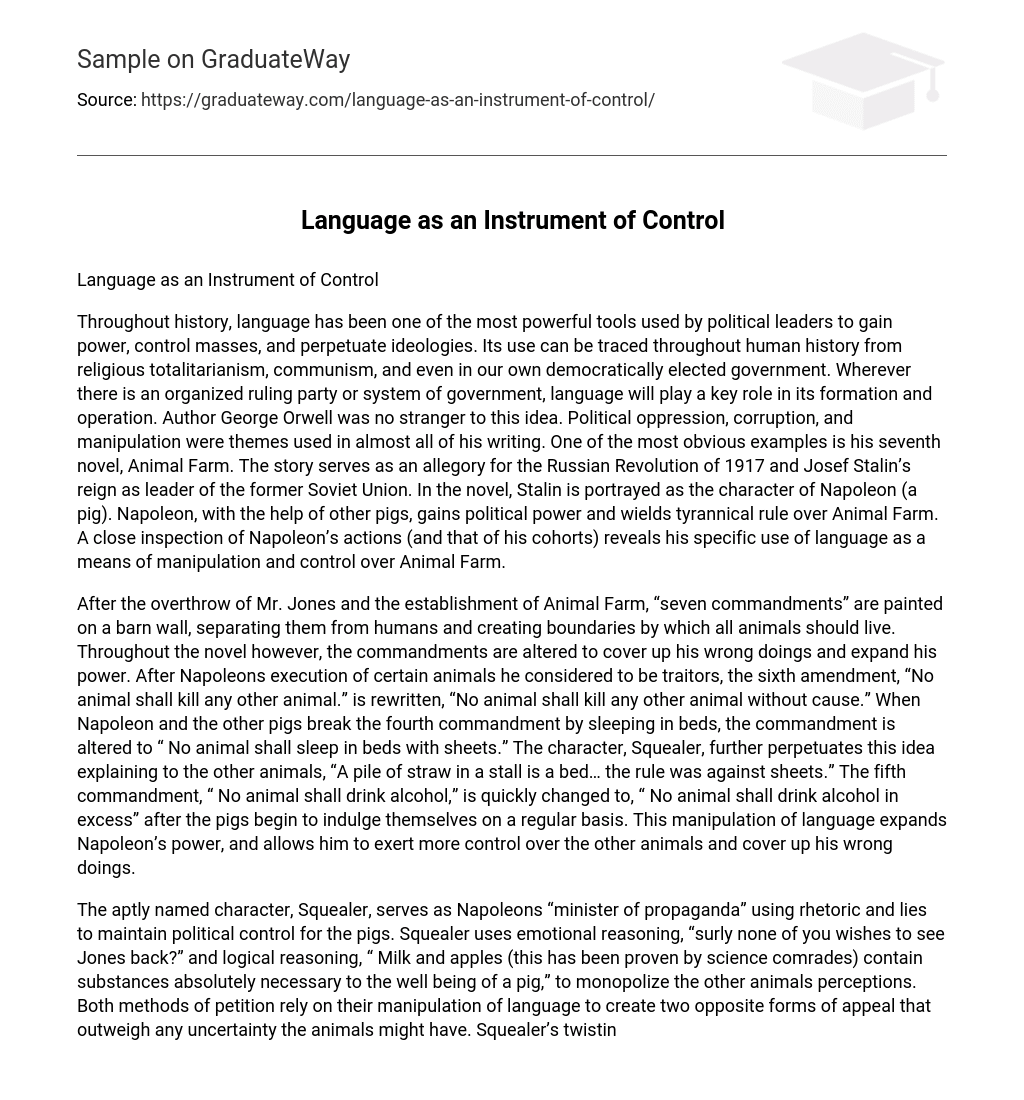Throughout history, language has been a powerful tool used by political leaders to gain power, control masses, and perpetuate ideologies. This use can be seen in religious totalitarianism, communism, and even our own democratically elected government. Language plays a key role in the formation and operation of any organized ruling party or system of government. Author George Orwell understood this concept well and frequently incorporated themes of political oppression, corruption, and manipulation in his writing. One clear example of this can be found in his seventh novel, Animal Farm. This story serves as an allegory for the Russian Revolution of 1917 and Josef Stalin’s reign as leader of the former Soviet Union. In the novel, Stalin is symbolized by the character Napoleon, a pig who gains political power with the help of other pigs and exercises tyrannical control over Animal Farm. By examining Napoleon’s actions and those of his cohorts, it becomes evident that he employs language manipulation to maintain control over Animal Farm.
After Mr. Jones is overthrown and Animal Farm is established, the “seven commandments” are painted on a barn wall to create boundaries and separate the animals from humans. However, throughout the novel, these commandments are modified to hide Napoleon’s actions and increase his authority. One such modification occurs after Napoleon executes animals he perceives as traitors; the sixth commandment, “No animal shall kill any other animal,” is changed to “No animal shall kill any other animal without cause.” Similarly, when Napoleon and the other pigs violate the fourth commandment by sleeping in beds, it is altered to “No animal shall sleep in beds with sheets.” Squealer reinforces this notion by explaining that a pile of straw in a stall qualifies as a bed and that the rule was against using sheets. Additionally, the fifth commandment, “No animal shall drink alcohol,” swiftly becomes “No animal shall drink alcohol in excess” once the pigs begin indulging themselves regularly. By manipulating language in this way, Napoleon strengthens his power and maintains control over the other animals while concealing his wrongdoing.
The character called Squealer, who is appropriately named, acts as Napoleon’s “minister of propaganda.” Squealer employs rhetoric and deceit to maintain political control for the pigs. He uses emotional and logical arguments to manipulate the perceptions of other animals. For instance, he asks, “Surely none of you wants to see Jones back?” and claims, “Milk and apples (this has been proven by science comrades) contain substances absolutely necessary to the well-being of a pig.” Both methods rely on manipulating language to create two contrasting forms of appeal that suppress any doubts the animals may have. Squealer’s manipulation of words is most evident after “The Battle of the Windmill.” The animals, exhausted from fighting and devastated by the loss of their labor, are immediately approached by Squealer, who declares, “Thanks to the leadership of Comrade Napoleon, we have won every inch of Animal Farm back again!” This convinces the animals not only that they are victorious, but also that Napoleon’s leadership is responsible for the victory. Squealer’s use of language to manipulate the other animals is one of the key factors enabling the pigs to maintain control over Animal Farm.
Throughout the second half of the novel, Napoleon uses self-reverential language to surround the animals. He gives himself medals and convinces the poet pig, Murial, to compose a poem praising him. This poem is painted on a barn wall next to the seven commandments, symbolizing that Napoleon’s praise is equal to the commandments of Animal Farm. This language brainwashes the animals, who now give Napoleon credit for all success and good fortune. They have a devotion to Napoleon akin to a god-like figure. They believe that the water tastes excellent thanks to his leadership. This devotion demonstrates Napoleon’s complete control over Animal Farm. He can now discard the original commandments and replace them with the motto “All animals are equal, but some are more equal than others.”
Napoleon’s use of language throughout the novel gives him the opportunity to justify all his actions and maintain complete control over Animal Farm. This is evident in the closing scene where the animals are unable to differentiate between him and a human: “The creatures outside looked from pig to man, and from man to pig, and from pig to man again, but already it was impossible to say which was which.” The distortion caused by political language serves as a significant theme in the book, imparting a timeless lesson to its readers. Orwell encapsulates this idea with a single quote: “Political language… is designed to make lies sound truthful and murder respectable, and to give an appearance of solidity to pure wind.”





